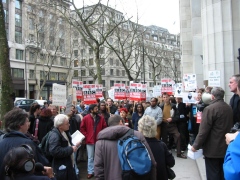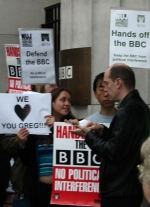Staff hit the streets in BBC protest
Thousands of BBC staff joined protests organised by BECTU and the NUJ outside their workplaces today.
The protests, organised to show support among staff for the BBC's independence, followed a spontaneous mass walkout a week earlier when DG Greg Dyke resigned.

|
| Staff rallying at London's BBC Bush House |
Unions have warned that the government should not interfere with the BBC's editorial decisions in the wake of Hutton's damning report on the David Kelly tragedy. There has also been a call for a completely transparent and independent process to replace Dyke, and ex-Chair of BBC Governors Gavyn Davies, who also resigned last week.
Speakers at one of the largest protests, outside the BBC's news HQ at Television Centre in West London, urged the Governors to stand firm in defence of independent journalism and programme-making in the Corporation, and criticised the comprehensive public apology they had made shortly after publication of the Hutton report.
Labour MP Austin Mitchell, speaking at the TV Centre rally, said he had never seen a war "as bloody or dictatorial" between government and the BBC as the row over Andrew Gilligan's story on the run-up to the Iraq war.

|
| Staff had messages to send from pavements across the UK |
Good turnouts were reported in centres as far spread as Glasgow, Cardiff, Belfast, Caversham, and Birmingham.
Staff also turned out at other London buildings, including Bush House, home of the BBC World Service, and Broadcasting House, corporate HQ.
A key message from union officials at the protests was that the gravest dangers to the BBC lie ahead, over the year-long process of debate about the Royal Charter, due for renewal in 2006.
Speakers warned of the dangers of new controls on the BBC being written into the Charter allowing more government pressure on the Corporation. There was also the financial risk of "top-slicing" being introduced - diversion of part of the licence income to fund programme-making by other broadcasters.
BECTU and the NUJ plan to continue building a campaign of support for the BBC, aimed at winning a guarantee from government that the Corporation will be given the independence and funding it needs to remain the world's premier public service broadcaster.
